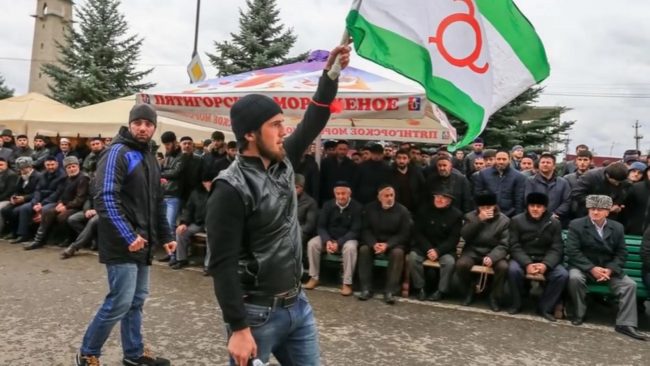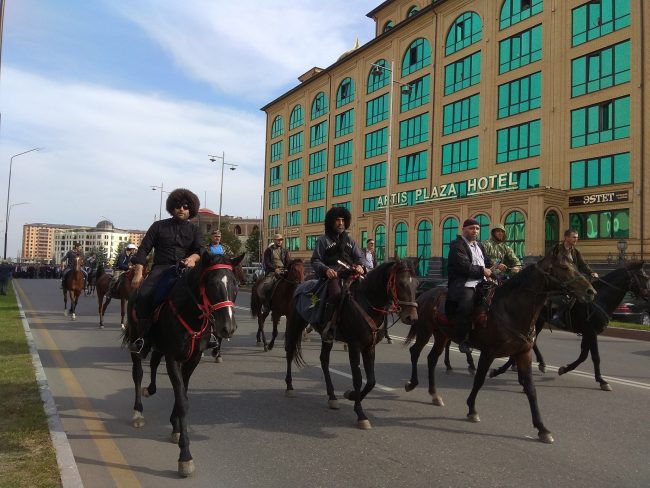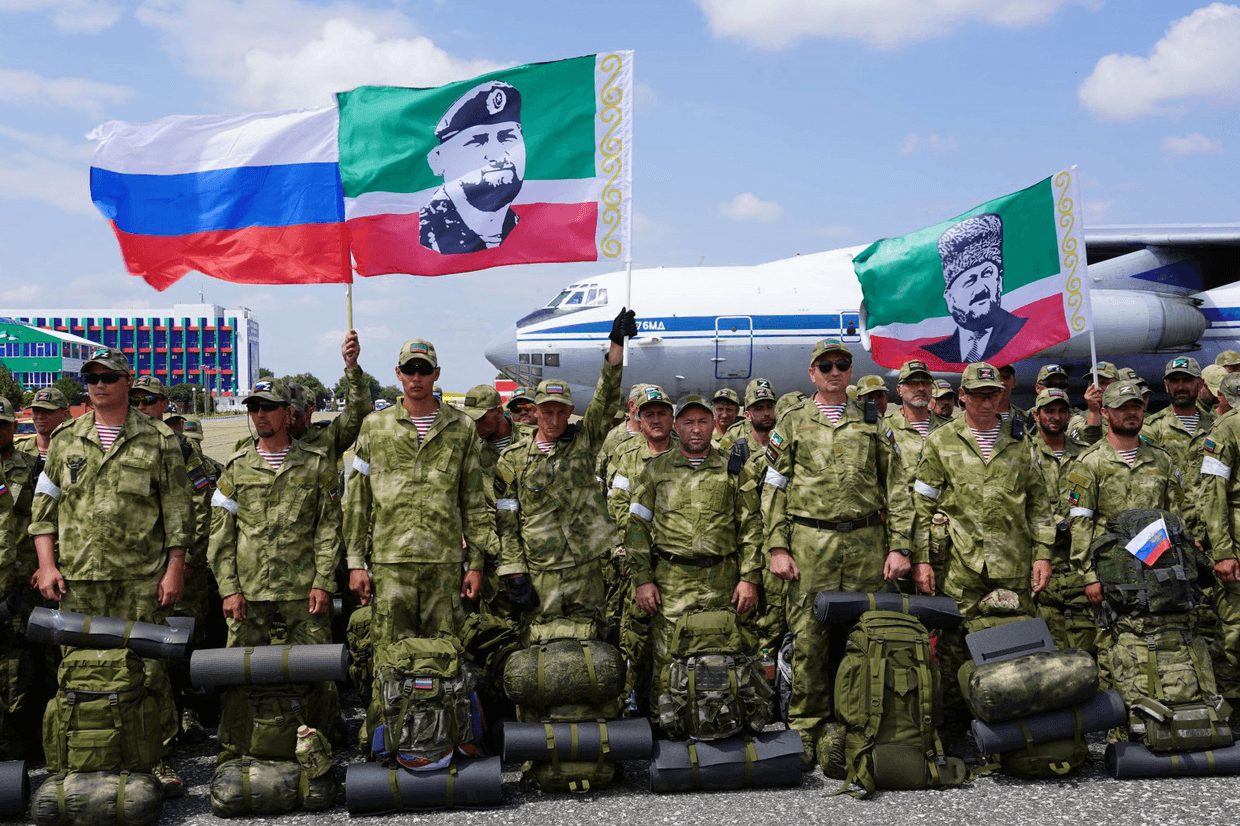

 A political crisis in the Russian Republic of Ingushetia is continuing over a border agreement with neighbouring Chechnya. Protests entered their ninth day in the Ingush capital Magas on Friday, with demands for repealing the agreement, a referendum, and the resignation of Ingush Head Yunus-Bek Yevkurov.
A political crisis in the Russian Republic of Ingushetia is continuing over a border agreement with neighbouring Chechnya. Protests entered their ninth day in the Ingush capital Magas on Friday, with demands for repealing the agreement, a referendum, and the resignation of Ingush Head Yunus-Bek Yevkurov.
On Wednesday, Ingush journalists and activists told OC Media that police had issued search warrants for three of the protest organisers: chair of the protest committee Musa Malsagov, chair of the teips (clans) council Malsag Uzhakhov, and opposition activist from local organisation Mekhk-Qel, Ismail Sultygov.
A criminal case was also opened against Malsagov for ‘publicly insulting’ Zyalimkhan Yevloyev, the Chairman of the Government of Ingushetia.
Since Monday, several MPs in Ingushetia’s parliament, the People’s Assembly, have repeatedly tried to convene to repeal the the 4 October vote approving the border change. The MPs said the results of the vote were falsified.
These votes have so far failed due to a lack of quorum, with each time 10–12 of 32 MPs attending voting — less than the minimum 17 MPs required.
Protester Yakub Gogiyev told OC Media that the some MPs weren’t showing up to vote due to pressure from Ingush Head Yunus-Bek Yevkurov.
[Read about the beginning of the protests on OC Media: Protests erupt in Ingushetia as MPs say Chechnya land swap vote was falsified]

Support from outside Ingushetia
On Sunday, the fourth day of the protests, Ingushetia’s first president Ruslan Aushev arrived to to support protesters.
Aushev remains a highly respected figure in the republic, and the number of protesters increased after his arrival.
Speaking at the rally, Aushev said the authorities should take ‘the people’s opinion’ into account, including by holding a referendum. Aushev said that the Ingush leadership made a mistake by signing the border agreement without consulting the people.
On the same day, activists from neighbouring republics also arrived to Ingushetia to address the protesters.
Valery Khatazhukov, a human rights activist from Kabardino-Balkaria, said that ‘the entire North Caucasus is closely following what is happening in Ingushetia’. According to him, the Ingush protest could set a precedent for the North Caucasus or even the whole of Russia.
‘This is a case where all peoples of the North Caucasus should say — there will be no violence here’, Khatazhukov said.
According to Kabardian nationalist activist Ibragim Yaganov, the Ingush protests have become a historic moment for the entire North Caucasus and Russia.
‘For the first time in Russia’s recent history, the people, along with the main branches of the government, came together to defend their interests’, he said.
Yaganov said that despite both the Russian and the Soviet constitutions saying that power belongs to the people, ‘we have been living in a completely different way — people never decided anything’.
‘Last straw’
On Monday, a delegation of Ingush opposition activists and government officials met Aleksandr Matovnikov, Russian President Vladimir Putin’s representative to the North Caucasus.
The meeting was also attended by the Chechen Speaker of Parliament and Chechen Head Ramzan Kadyrov’s right hand — Magomed Daudov — and Chechnya’s mufti, Salakh Mezhiyev.
The Ingush delegation reiterated their demand for the Ingush government to comply with the constitution and hold a referendum on the border agreement, while Daudov said that the Chechen side didn’t need ‘even a metre of Ingush land’ and was ready to come to Ingushetia for further discussions.
Ingush opposition MP Musa Abadiyev, who took part in the meeting, wrote on Facebook that the Russian authorities did not expect such strong opposition to the border agreement.
He wrote that the Ingush delegation raised grievances about high levels of unemployment and corruption in Ingushetia as well as over Prigorodny District, a chunk of land lost to North Ossetia following the 1944 deportations.
He said that the agreement struck by Ingush head Yunus-Bek Yevkurov and Chechen head Ramzan Kadyrov was ‘the last straw in people’s patience’.
One protest leader told OC Media that Yevkurov, having signed the agreement, had become a ‘political corpse’, but it was too early to speculate whether the Russian leadership would leave him in power or opt for his resignation.
He said that even if he were to resign early, Yevkurov wouldn’t leave his post before the resolution of the conflict, as it would be widely received as a sign of weakness in Russia’s leadership.
What’s in the deal
Mass protests erupted in Magas on 4 October, the day of the vote in Ingushetia’s People’s Assembly approving the border agreement. Several MPs announced that the vote was rigged, while the Ingush Constitutional Court declared the deal unconstitutional and demanded a referendum.
According to the bill, a part of Ingushetia’s Sunzha District will be handed over to Chechnya. The head of Chechnya, Ramzan Kadyrov, has claimed the disputed area to be part of Chechnya’s Galanchozh District.
As of 12 October, the full text of the new law hasn’t been published on the website of Ingushetia’s National Assembly and it remains unclear how much land will be swapped between the two republics.
Chechen authorities have openly claimed territories in eastern Ingushetia for a number of years, despite a 1993 Chechen–Ingush agreement that left most of Sunzha District within Ingushetia.
The Chechen claims, which refer to Soviet maps from the 1930s, continued even after Ingush President Murat Zyazikov and Chechen President Akhmat-Khadzhi Kadyrov (the father of the current leader, Ramzan Kadyrov) confirmed the existing borders in 2003.
Between 1936–1993, Chechnya and Ingushetia existed as the Chechen–Ingush Autonomous Soviet Socialist Republic and the border between them was not demarcated.






